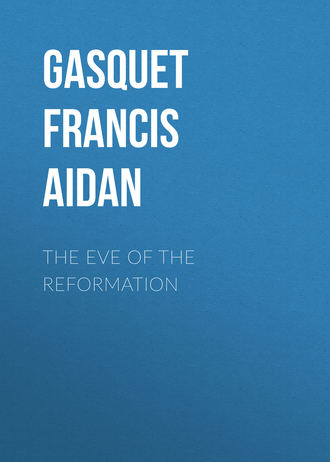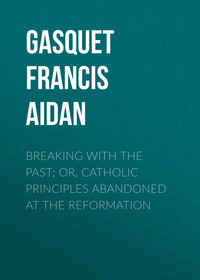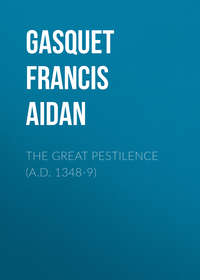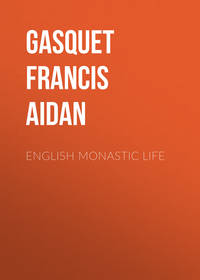 полная версия
полная версияThe Eve of the Reformation
(5) Permission to clergy to hold more than one benefice.
(6) Cardinals being allowed to hold sees. They ought to be counsellors to the Pope in Rome, and when holding sees they are more or less dependent on the will of the kings, and so cannot give independent advice and speak their minds.
(7) Absence of bishops from their sees.
(8) Such religious houses as needed correction should be forbidden to profess members, and when they die out, their places should be taken by fervent religious. Confessors for convents must be approved by the ordinaries of the place.
(9) The use of the keys ought never, under any pretext, to be granted for money.
(10) Questors of the Holy Spirit, St. Anthony, &c., who foster superstition among the poor people, should be prohibited.
(11) Confessional privileges and use of portable altars to be very rarely allowed.
(12) No indulgences to be granted except once a year, and in the great cities only.
Finally they say of Rome: “Hæc Romana civitas et ecclesia mater est et magistra aliarum ecclesiarum,” and hence it should be a model to all. Foreigners, however, who come to St. Peter’s find that priests “sordidi, ignari, induti paramentis et vestibus quibus nec in sordidis ædibus honeste uti possent, missas celebrant.”
Cardinal Sadolet, on receiving a copy of Sturmius’s letter, replied in kindly terms. He had, he declared, a high opinion of “Sturmius, Melanchthon, and Bucer, looking on them as most learned men, kindly disposed, and cordially friendly to him. He looked upon it as the peculiar characteristic of Luther to try and overwhelm all his opponents with shouts and attacks.” He speaks of the great piety of Pope Clement from personal knowledge. His wars were, he said, rather the work of his adversaries than his own (De consilio, ed. J. G. Schelhorn, 1748, p. 91).
He also, in 1539, penned the De Christiana Ecclesia (in Specilegium Romanum, ii. p. 101 seqq.), sending it to Cardinal Salicati, and asking him to pass it on to Cardinal Contarini. It was the outcome of conversations about the troubles of the Church, and the result of the movement was the Council of Trent, to restore, as Sadolet says, ecclesiastical discipline “quæ nunc tota pæne nobis e manibus elapsa est.”
118
Sermon on Palm Sunday, Berthelet, 1539.
119
Lancelot Ridley, Commentary in Englyshe on Sayncte Paule’s Epystle to the Ephesians, L. 4.
120
This important paper was printed for the first time in the Dublin Review, April 1894, pp. 390-420.
121
A treatise concerning the division between the spiritualtie and temporaltie. London: Robert Redman, f. 2.
122
English Works, p. 871. In the quotations made from the works of Sir Thomas More and other old writings, for the sake of the general reader the modern form of spelling has been adopted, and at times the words transposed to ensure greater clearness.
123
Ibid., p. 875.
124
Ibid., p. 882.
125
Salem and Bizance. A dialogue betwixte two Englishmen, whereof one was called Salem and the other Bizance. London: Berthelet, 1533, f. 5.
126
English Works, p. 934.
127
Ibid., p. 870.
128
Ibid., p. 877.
129
Ibid., p. 877.
130
Ibid., p. 878.
131
Ibid., pp. 937, 938.
132
A treatise concerning the division, f. 8.
133
English Works, p. 880.
134
Ibid., p. 951.
135
A treatise concerning the division, f. 3.
136
A treatise concerning the division, f. 41.
137
English Works, p. 884.
138
Ibid., p. 895.
139
Ibid.
140
Ibid., p. 896.
141
Ibid., p. 885.
142
Bishop Fisher gives much the same testimony to the moral character of the religious generally in his sermon against Luther. After praising the state of virginity, he continues: “And it is not to be doubted but that there is in Christendom at this day many thousands of religious men and women that full truly keep their religion and their chastity unto Christ… If Almighty God did reserve in that little portion of Jewry so great a multitude beyond the estimation of the prophet, what number suppose ye doth yet remain in Christendom of religious men and women, notwithstanding this great persecution of religious monasteries, both of men and women, done by these heretics by this most execrable doctrine? It is not to be doubted but in all Christendom be left many thousands who at this hour live chaste, and truly keep their virginity unto Christ.” (A Sermon had at Paulis, Berthelet, f. g. ii.)
143
Ibid., p. 735. Sir Thomas More, in his Dyalogue, thinks that the number of priests without very definite work had tended to diminish the respect paid to them by the laity. “But were I Pope,” he says, … “I could not well devise better provisions than by the laws of the Church are provided already, if they were as well kept as they are well made. But as for the number, I would surely see such a way therein that we should not have such a rabble that every mean man must have a priest in his house to wait upon his wife. This no mean man lacketh now, to the contempt of the priesthood, (placed) in as vile an office as his horsekeeper. That is truth indeed, quod he, and in worse, too, for they keep hawks and dogs.” If the laws of the Church were kept, there would not be the excessive number of priests for fit and proper positions, so that “the whole order is rebuked by the priests’ begging and lewd living who are either obliged to walk as rovers, and live upon trentals or worse, or serve in a secular man’s house” (English Works, p. 223).
144
A treatise concerning the division, ff. 14-16.
145
Dyalogue, &c., f. 2.
146
A treatise concerning the division, f. 23.
147
Ibid., f. 25.
148
Ibid., f. 26.
149
English Works, p. 936.
150
English Works, p. 620.
151
A Sermonde … made in 1538. By John Longlande, Bishop of Lincolne. London: f. 2.
152
Henry VIII., vol. ii. pp. 50-1.
153
Ibid., vol. i. p. 600.
154
Ibid., ii. p. 470.
155
Wilkins, Concilia, iii. 717.
156
Sermo Exhortatorius, W. de Worde.
157
Gairdner, Calendar of Papers Foreign and Domestic, v., preface, ix.
158
Froude’s translation.
159
Opera, ed. Leclerc, iii. col. 102.
160
Ibid., Ep. 144.
161
In one of his works Erasmus gives the highest praise to English ecclesiastics for their single-minded devotion to their clerical duties. He contrasts them with clerics of other nations in regard to worldly ambitions, &c. “Those who are nearest to Christ,” he writes, “should keep themselves free from the baser things of this world. How ill the word ‘general’ sounds when connected with that of ‘Cardinal,’ or ‘duke’ with that of ‘bishop,’ ‘earl’ with that of ‘abbot,’ or ‘commander’ with that of ‘priest.’ In England the ecclesiastical dignity is the highest, and the revenues of churchmen abundant. In that country, however, no one who is a bishop or abbot has even a semblance of temporal dominion, or possesses castles or musicians or bands of retainers, nor does any of them coin his own money, excepting only the Archbishop of Canterbury, as a mark of dignity and honour, which has been conferred on him on account of the death of Saint Thomas; he is, however, never concerned in matters of war, but is occupied only in the care of the churches.” (Consultatio de Bello Turcico. Opera, ed. Leclerc, tom. v. p. 363.)
162
Opera, &c., ut sup., Ep. 149.
163
Ibid., Ep. 175.
164
Ibid., Ep. 216.
165
Ibid., Ep. 272.
166
Ibid., Ep. 474.
167
Thomas More, Epigrammata (ed. Frankfort, 1689), p. 284 seqq.
168
Ibid., Ep. 148.
169
Erasmus, p. 63.
170
Quarterly Review, January 1895, p. 23.
171
The question about Erasmus’s translation of this word came up in the discussion between Sir Thomas More and Tyndale about the use made by the latter of the word congregatio for Church in his version of the New Testament. More writes: “Then he asketh me why I have not contended with Erasmus, whom he calls my darling, all this long time, for translating this word ecclesia into this word congregatio, and then he cometh forth with his proper taunt, that I favour him of likelihood for making of his book of Moriæ in my house… Now for his translation of ecclesia by congregatio his deed is nothing like Tyndale’s. For the Latin tongue had no Latin word used before for the Church but the Greek word ecclesia, therefore Erasmus in his new translation gave it a Latin word… Erasmus also meant no heresy therein, as appears by his writings against the heretics.” (English Works, pp. 421, 422.)
172
Ep. 384.
173
Ep. 423.
174
Ep. 531. Lee’s account of his quarrel with Erasmus is given in his Apologia, which he addressed to the University of Louvain. He states that Erasmus had come to his house at that place, and had asked him to aid in the corrected version of his New Testament which he was then projecting. At first Lee refused, but finally, on being pressed by Erasmus, he consented, and began the work of revision, but Erasmus quickly became angry at so many suggested changes. Reports about the annotations and corrections proposed by Lee began to be spread abroad, and Erasmus hearing of them, suspected some secret design, and came from Basle to try and get a copy of the proposed criticism. Lee wished that it should be considered rather a matter of theology than of letters. Bishop Fisher wrote, on hearing rumours of the quarrel, urging Lee to try and make his peace with Erasmus, and in deference to this, Lee informed Erasmus that he would leave the matter entirely in the hands of the bishop, and had forwarded to him the book of his proposed criticisms. Erasmus, however, did not wait, but published the Dialogus Domini Jacobi Latomi, which all regarded as an attack upon Lee. The latter would have published a reply had he not received letters from England from Fisher, Colet, Pace, and More, begging him to keep his temper. Lee agreed to stop, and only asked Fisher to decide the matter quickly. On returning to Louvain, Lee found that Erasmus had published his Dialogus bilingium et trilingium, in which Lee was plainly indicated as a man hostile to the study of letters in general. This Lee denied altogether, and in brief, he does not, he says, condemn Erasmus’s notes on the New Testament so much as the copy he had taken as the basis for his corrections of the later text. “Politian,” says Lee, at the end of his Apologia, “Politian declares that there are two great pests of literature – ignorance and envy. To these I will add a third – ‘adulation’ – for I have no belief in any one who, having made a mistake, is not willing to acknowledge it.”
Lee’s criticism of Erasmus’s translation appeared at Louvain in January 1520. It produced an immediate reply from Erasmus, published at Antwerp in May 1520 – a reply “all nose, teeth, nails, and stomach.” In this Erasmus says that 1200 copies of the New Testament had been printed by Froben. In the collation he had been much assisted by Bishop Tunstall, who had, in fact, supplied the exemplar on which he had worked. Erasmus then gives what he thinks is the correct version of the differences between Lee and himself. Lee, he says, was only just beginning Greek, and Erasmus, who had been working at the correction of his version of the Testament, showed him what he was doing. The margins of the book were then full of notes, and here and there whole pages of paper were added. Lee said that he had a few notes that might be useful, and Erasmus expressed his pleasure at receiving help and asked for them. Lee thereupon gave him some miscellaneous jottings, and of these, according to Erasmus’s version of the facts, he made use of hardly anything. Soon, however, reports were spread about that out of some three hundred places in which Lee had corrected the first edition of the translation, Erasmus had adopted two hundred. Bishop Fisher tried to make peace, and to prevent two men who both meant well to the cause of religion from quarrelling in public. His intervention was, however, too late, as already the letter of Erasmus to Thomas Lupset had appeared and thus rendered reconciliation impossible.
175
Ep. 231.
176
Ep. 380. This bishop must have been the Spaniard, George de Athegua, who was appointed to the see of Llandaff in 1517, and held it for twenty years.
177
Ep. 380.
178
Ep. 453.
179
Ep. 416.
180
Ep. 547.
181
Ep. 529. Erasmus wrote strongly against anything that seemed to favour the idea of national churches. After declaring that national dislikes and enmities were unmeaning and unchristian, he continues: “As an Englishman you wish evil fortune to a Frenchman. Why not rather do your wishes come as a man to a fellow-man? Why not as a Christian to a Christian? Why do these frivolous things have greater weight than such natural ties, such bonds of Christ? Places separate bodies, not souls. In old days the Rhine divided a Frenchman from a German, but the Rhine cannot divide one Christian from another. The Pyrenees cut off Spain from France, but these mountains do not destroy the communion of the Church. The sea divides the English and French peoples, but it cannot cut off the society of religion…” The world is the fatherland of all people; all men are sprung from a common stock. “The Church is but one family, common to all.” (Opera., tom. iv. col. 638.)
182
Ep. 715.
183
Ep. 723.
184
Ep. 477.
185
Ep. 528.
186
Ep. 656.
187
Ep. 334 (second series.)
188
Spongia (Basle, Froben, 1523), c. 5.
189
Ibid., sig. d. 4.
190
Ibid., sig. e. 2.
191
Ibid., sig. e. 2. The supreme authority of the Pope is asserted by Erasmus in numberless places in his works. For example, in the tract Pacis Querimonia, after saying that he cannot understand how Christians, who understand Christ’s teaching and say their Pater noster with intelligence, can always be at strife, he proceeds: “The authority of the Roman Pontiff is supreme. But when peoples and princes wage impious wars, and that for years, where then is the authority of the Pontiffs, where then is the power next to Christ’s power?” &c. (Opera., tom. iv. p. 635). So too in his Precatio pro Pace Ecclesiæ, after praying that God would turn the eyes of His mercy upon the Church, over which “Peter was made Supreme Pastor,” he declares that there is but “one Church, out of which there is no salvation.”
192
Ep. 478.
193
Ep. 501.
194
Ep. 563.
195
Ep. 600.
196
Ep. 563.
197
Ep. 667.
198
Ep. 501 (Mr. Froude’s translation).
199
Ep. 793.
200
Ep. 823.
201
Ep. 751.
202
The Pope himself read the Enconium Moriæ and understood the spirit of the author; at least so Erasmus was told. He wrote at the time “the Supreme Pontiff has read through Moriæ and laughed; all he said was, ‘I am glad to see that friend Erasmus is in the Moriæ,’ and this though I have touched no others so sharply as the Pontiffs” (Ep. p. 1667). What Sir Thomas More thought about it may be given in his own words, written some years later. “As touching Moriæ, in which Erasmus, under the name and person of Moria, which word in Greek signifies ‘folly,’ merely touches and reproves such faults and follies as he found in any kind of people pursuing every state and condition, spiritual and temporal, leaving almost none untouched. By this book, says Tyndale, if it were in English, every man should then well see that I was then far otherwise minded than I now write. If this be true, then the more cause have I to thank God for the amendment. God be thanked I never had that mind in my life to have holy saints’ images or their holy relics out of reverence. Nor if there were any such thing in Moriæ this could not make any man see that I were myself of that mind, the book being made by another man though he were my darling never so dear. Howbeit, that book of Moriæ doth indeed but jest upon abuses of such things… But in these days, in which men by their own default misconstrue and take harm from the very Scripture of God, until men better amend, if any man would now translate Moriæ into English, or some work either that I have myself written ere this, albeit there be no harm therein, folks being (as they be) given to take harm of what is good, I would not only my darling’s books, but my own also, help to burn them both with my own hands, rather than folk should (though through their own fault) take any harm of them.” (English Works, pp. 422-3.)
203
Opera Omnia (Froben’s ed., 1540), i. p. 831.
204
Pp. 832-33.
205
P. 837.
206
A case in point was the finding of the celebrated statue of the Laocöon on January 14, 1506. This discovery was accidentally made in a vineyard, near Santa Maria Maggiore, and no statue ever produced so general and so profound an emotion as the uncovering of this work of art did upon the learned world of Rome. The whole city flocked out to see it, and the road to the vineyard was blocked day and night by the crowds of cardinals and people waiting to look at it. “One would have said,” writes a contemporary, “that it was a Jubilee.” And even to-day the visitor to the Ara Cœli may read on the tomb of Felice de Fredis, the happy owner of the vineyard, the promise of “immortality,” ob proprias virtutes et repertum Laocohontis divinum simulachrum (I. Klaczki, Jules II., p. 115). It is not at all improbable that in the above passage Erasmus was actually thinking of the delirium caused by the finding of this statue.
207
Ibid., p. 838.
208
For example, the Rev. W. H. Hutton states in the Guardian, January 25, 1899, as the result of his mature studies upon the Reformation period, that “the so-called divorce question had very little indeed to do with the Reformation.” Mr. James Gairdner, who speaks with all the authority of a full and complete knowledge of the State papers of this period, in a letter to a subsequent number of the Guardian, says, “When a gentleman of Mr. Hutton’s attainments is able seriously to tell us this, I think it is really time to ask people to put two and two together, and say whether the sum can be anything but four. It may be disagreeable to trace the Reformation to such a very ignoble origin, but facts, as the Scottish poet says, are fellows you can’t coerce … and won’t bear to be disputed.” What “we call the Reformation in England … was the result of Henry VIII.’s quarrel with the Court of Rome on the subject of his divorce, and the same results could not possibly have come about in any other way.” When “Henry VIII. found himself disappointed in the expectation, which he had ardently cherished for a while, that he could manage, by hook or by crook, to obtain from the See of Rome something like an ecclesiastical licence for bigamy,” he took matters into his own hands, “and self-willed as he was, never did self-will lead him into such a tremendous and dangerous undertaking as in throwing off the Pope. How much this was resented among the people, what secret communications there were between leading noblemen with the imperial ambassador, strongly urging the emperor to invade England, and deliver the people from a tyranny from which they were unable to free themselves, we know in these days as we did not know before.”
209
Camden Society, p. 163.
210
The same high authority, in a letter to the Guardian, March 1, 1899, says, “People will tell you, of course, that the seeds of the Reformation were sown before Henry VIII.’s days, and particularly that it was Wycliffe who brought the great movement on. I should be sorry to depreciate Wycliffe, who did undoubtedly bring about a great movement in his day, though a careful estimate of that movement is still a desideratum. Even in theology the cardinal doctrine of the Reformation – justification by faith – is in Wycliffe, I should say, conspicuous by its absence. But, whatever may be the theological debt of England to Wycliffe at the present day, twenty Wycliffes, all highly popular, in the fifteenth and sixteenth centuries would not have brought about a Reformation like that under which we have lived during the last centuries. That was a thing which could only have been effected by royal power – as in England, or by a subversion of royal authority through the medium of successful rebellion – as in Scotland.”
211
Henry VIII., i. p. 51.
212
Roger Edgworth, Sermons (London: Robert Caly, 1557), preface.
213
English Works, p. 339.
214
Strype, Eccl. Mem. (ed. 1822), I. i. p. 254.
215
This book was apparently condemned for reflecting on the king’s divorce rather than for its Lutheran tendencies. “The Soul’s Garden,” as Bishop Tunstall calls it, was printed abroad, and “very many lately brought into the realm, chiefly into London and into other haven towns.” The objectionable portion was contained in “a declaration made in the kalendar of the said book, about the end of the month of August, upon the day of the decollation of St. John Baptist, to show the cause of why he was beheaded.” (Strype, ut supra, ii. p. 274.)




